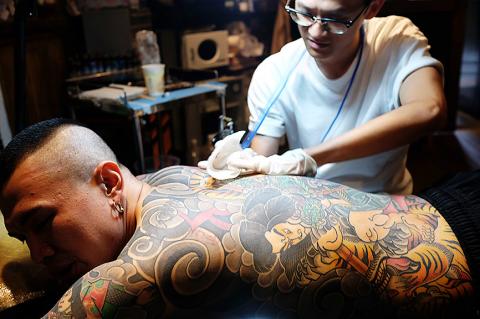In a small workshop down a narrow alleyway in Taipei’s Ximending (西門町) area, tattoo artist Bobo Chen is refreshing a scene from a Japanese epic with new ink on a client’s back.
The vivid image depicts a fictional Japanese hero fighting a tiger and dragon, symbolic of strength and protection.
A former graffiti artist, Chen, 35, switched to tattooing five years ago after learning the craft in Thailand.

Photo: SAM YEH / AFP
On the walls of his studio are pictures of historical Japanese drawings, which he takes as inspiration for his body art.
Taiwan was ruled by Japan for 50 years until 1945 and the nation’s design aesthetic often still reflects Japanese style.
“I like Japanese culture and traditions,” Chen said. “I take inspiration from them for my work, because I’d like to play a small part in handing them down.”
It also pays the bills — Chen does mostly large-scale tattoos and charges more than NT$3,000 per hour. A large tattoo costs as much as NT$300,000.
He does not advertise, but said he has plenty of clients through word of mouth.
Chen said that the trend of having larger-scale tattoos has grown more popular in Taiwan in recent years as people become less conservative about they way they look.
He talks through the process with clients before going ahead, he said, adding that they often decide to have tattoos when they are suffering “frustration or disappointment” in life.
Micky Peng, 30, who sports the epic back design Chen is touching up, as well as a tiger pattern on his chest, said receiving tattoos had been cathartic for him.
He first started when his father fell ill 10 years ago and it was a way to release emotional stress, Peng said.
“I feel like I am being protected by the hero tattoo on my body,” said Peng, who runs a tofu dessert shop in Taichung. “I think I’m addicted to it. Getting new tattoos makes me happier and feel that I am more unique.”

Taiwan’s Liu Ming-i, right, who also goes by the name Ray Liu, poses with a Chinese Taipei flag after winning the gold medal in the men’s physique 170cm competition at the International Fitness and Bodybuilding Federation Asian Championship in Ajman, United Arab Emirates, yesterday.

Costa Rica sent a group of intelligence officials to Taiwan for a short-term training program, the first time the Central American country has done so since the countries ended official diplomatic relations in 2007, a Costa Rican media outlet reported last week. Five officials from the Costa Rican Directorate of Intelligence and Security last month spent 23 days in Taipei undergoing a series of training sessions focused on national security, La Nacion reported on Friday, quoting unnamed sources. The Costa Rican government has not confirmed the report. The Chinese embassy in Costa Rica protested the news, saying in a statement issued the same

A year-long renovation of Taipei’s Bangka Park (艋舺公園) began yesterday, as city workers fenced off the site and cleared out belongings left by homeless residents who had been living there. Despite protests from displaced residents, a city official defended the government’s relocation efforts, saying transitional housing has been offered. The renovation of the park in Taipei’s Wanhua District (萬華), near Longshan Temple (龍山寺), began at 9am yesterday, as about 20 homeless people packed their belongings and left after being asked to move by city personnel. Among them was a 90-year-old woman surnamed Wang (王), who last week said that she had no plans

TO BE APPEALED: The environment ministry said coal reduction goals had to be reached within two months, which was against the principle of legitimate expectation The Taipei High Administrative Court on Thursday ruled in favor of the Taichung Environmental Protection Bureau in its administrative litigation against the Ministry of Environment for the rescission of a NT$18 million fine (US$609,570) imposed by the bureau on the Taichung Power Plant in 2019 for alleged excess coal power generation. The bureau in November 2019 revised what it said was a “slip of the pen” in the text of the operating permit granted to the plant — which is run by Taiwan Power Co (Taipower) — in October 2017. The permit originally read: “reduce coal use by 40 percent from Jan.